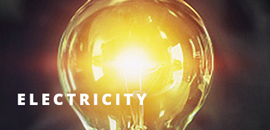PROGRESS REPORT
The University's energy use intensity climbed from 114.3 kBtu/sqft in fisca year 2023 to 116.9 kBtu/sqft in fiscal year 2024. Over the same period, total energy consumption increased by 21,463 MMBtu.
The University's Total Energy Cost Index ($/sqft) remained $1.72/sqft from fiscal year 2023 to fiscal year 2024.
Total water consumption has decreased by 82.9 Mgal between fiscal year 2023 and fiscal year 2024.
The University continues to replace equipment and systems that have reached the end of their useful lifespan. For new construction, the University consistently adopts the latest energy and water conservation initiatives. Additionally, existing areas are being retrofitted with light fixtures equipped with motion detectors and dimmer switches to further enhance energy efficiency.
The University has also continued installing HVAC units with outside air supply systems, incorporating air supply reduction devices and improved dehumidification controls to optimize performance.
At the Central Energy Plant, the University has replaced the boiler and variable frequency drive on pumps to improve efficiency.
Chilled water demand flow optimization is ongoing across campus buildings to enhance energy efficiency. The University continues to improve the use of the Building Automation System to monitor and optimize system operations, further reducing energy consumption. Additionally, the Johnson Building classrooms has been upgraded from pneumatic controls to direct digital controls, enabling night and weekend setbacks to improve energy savings. University is also enrolled in demand response program with Oncor.
GOALS
As established by the University of Texas-System Board of Regents in November of 2011, the University has been an active participant and completed implementing energy savings initiatives to achieve a 5 percent reduction on the Energy Utilization Index and a 3-5 percent reduction on Water Utilization Index over the 10-year period that concluded two years back and started another decade of continued savings.
| Utility | Target Year | Benchmark Year | Percentage Goal |
|---|---|---|---|
| Water | 2032 | 2022 | 3 |
| Electricity | 2032 | 2020 | 5 |
| Transportation Fuels | 2032 | 2022 | 5 |
| Natural Gas | 2032 | 2022 | 5 |
STRATEGY FOR ACHIEVING GOALS
The University continues to replace aging equipment and systems, with a focus on buildings that have historically had high energy consumption. These buildings are monitored to optimize equipment performance by programming operations to better align with user needs.
In its ongoing efforts to improve sustainability, the University designs new buildings with the latest HVAC and lighting technologies, adhering to all code requirements. Additionally, the University aims to incorporate the most up-to-date sustainability certifications and initiatives into its construction projects.
The University is also installing utility meters across campus to track energy consumption and has conducted campus-wide water efficiency audits.
To further enhance campus operations, the University continues upgrading buildings with the Siemens Desigo automation system and is implementing Siemens Demand Flow® technology to reduce cooling costs per ton of cooling delivered.
IMPLEMENTATION SCHEDULE
The University continues to install utility meters across campus to monitor and track energy and water consumption in its buildings. Energy and water conservation projects are implemented whenever funding is available from any source, with all expected savings being carefully quantified and documented. Auxiliary Enterprises and the Student Housing Group are on board following University leadership and are implementing their own energy and water savings initiatives.
AGENCY FINANCE STRATEGY
The University has evaluated participation in several programs offered by public institutions, such as the State Energy Conservation Office, which provides low-interest loans through the LoanSTAR Revolving Loan Program. This program supports initiatives like upgrading sports field lighting systems. Additionally, the University is involved in ONCOR's Electric Delivery Concierge program and Demand Response, which assists in creating an Energy Efficiency Action Plan aimed at reducing energy costs by 5 percent.
The University actively pursues rebates for HVAC and lighting installation projects offered by utility companies. These rebates help fund various conservation efforts, as well as support the Deferred Maintenance program and LERR funds, which are provided by the University. The LERR funds are also used to install utility meters across campus to monitor building energy consumption.
EMPLOYEE AWARENESS PLAN
The University encourages students, faculty and staff to participate in the Campus Race to Zero Waste, a program aimed at eliminating landfill waste and promoting extensive recycling.
The campus has been designed with a pedestrian-friendly infrastructure and continues to promote bicycle use among students, faculty and staff by installing numerous bike racks. This initiative has earned the University the Bicycle Friendly University certification from the League of American Bicyclists.
Additionally, the University actively promotes energy conservation by encouraging the campus community to turn off lights, HVAC systems and office equipment when not in use. To support these efforts, the University publishes newsletters, hosts events and distributes outreach materials focused on energy and water conservation.
The University has also introduced the Remote Green Office certification, which recognizes sustainability efforts made by students, faculty and staff in their homes. Furthermore, the University's Office of Sustainability is offering the Composting Challenge, providing resources and guidance on how to compost at home.






